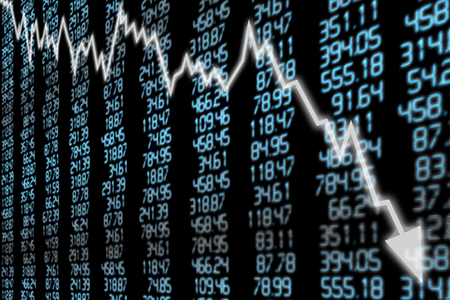Is the stock market crashing? The short answer: no—the Dow is just a little bumpy right now. Monday’s Wall Street frenzy had people from all over the world fearing that a U.S. real estate bubble might be the culprit after the stock market suddenly took a nearly 1,600-point (4.6 percent) plunge. According to CNN Money, it was the biggest point decline in history during a trading day.
However, experts say there’s no reason to worry. While homeownership rates and home prices are currently at an all-time high, they are not to blame for the market’s volatility.
“The types of corrections we are seeing this week in the U.S. stock markets are not expected to negatively impact the housing market unless the current volatility causes the market to significantly fall below normal levels,” says Joseph Kirchner, senior economist for realtor.com®. “Despite [the] correction, the market is still 15 percent above a year ago and economic fundamentals remain strong.”
The real concern? Rising interest rates to combat inflation. Could stock market volatility and a thriving housing sector spur the Fed to raise rates?
“The only concern is rising interest rates,” says Nancy Lulejian Starczyk, immediate past president of the Southland Regional Association of REALTORS® in California. “This limits the buyer. The perception is that the economy is doing exceedingly well. Consumer confidence is high—this makes real estate in our region continue to rise in value.”
In order to understand how a stock market crash would influence the real estate industry today, it is important to look back on the significant impacts of the crash of 2008, says Valerie Post, partner at Engel & Völkers Boston.
“Job losses, which were created by the stock market crash, forced an increase in foreclosures,” says Post. “In 2008, loosened lending standards that allowed many to qualify for higher mortgages than they should have been approved for, and inflated valuations, allowed for access to capital via bloated home equity lines.”
Post also says there was a lack of regulation and transparency from mortgage lenders, banks and financial institutions in regard to lending products and investments being created, and many did not understand these products.
Many procedures and regulations have been implemented since then. According to Post, the real estate industry would see a very different impact if the market were to crash compared to the events of 2008.
“For 2018, we are at full employment and a stock market crash will not have the same effect on foreclosure rates,” Post says. “In today’s market, the lending institutions have tightened standards to preserve equity in their portfolios, and, since 2008, the government has instituted regulations to protect consumers against predatory lending.”
Economists say it is nothing more than a blip that will correct itself over time. While the stock market remains bumpy, it is showing recovery. On Wednesday, the Dow opened with a 127-point loss that eventually turned into a 381-point gain before the Nasdaq dropped down 1 percent, according to CNN Money. Thursday’s activity brought more volatility—the Standard & Poor’s 500 stock index fell over 3 percent and the Dow dropped 3.5 percent, according to the New York Times.
“[The] stock market dip has not affected the housing market much yet,” says Aaron Terrazas, principal economist for Zillow Group. “We should expect equity markets to be volatile—they are a relatively high-risk asset prone to sharp movements. The recent stability is a historical anomaly. Traditionally, short-term volatility does not spill over into the real economy. If, however, the drop were to prove to be a longer-term phenomenon—lasting more than a couple of weeks—then we could start to see people’s confidence in the economy start to slip, which would impact labor and housing markets.”
Lawrence Yun, chief economist for the National Association of REALTORS® (NAR), also agrees that the sharp decline in stocks should not significantly impact the housing market because “underlying economic fundamentals remain strong,” according to REALTOR® Magazine. He says that correction is a natural part of the stock market’s cycle.
Of course, the market’s volatility could influence homebuyers’ decisions. According to a recent realtor.com survey of 1,215 homebuyers looking to buy in the next year, 52 percent plan to use stock market proceeds to fund a portion of their home purchase. Ninety percent of these respondents said their decision was influenced by the stock market’s recent activity.
Source: rismedia.com ~ By: Liz Dominguez

